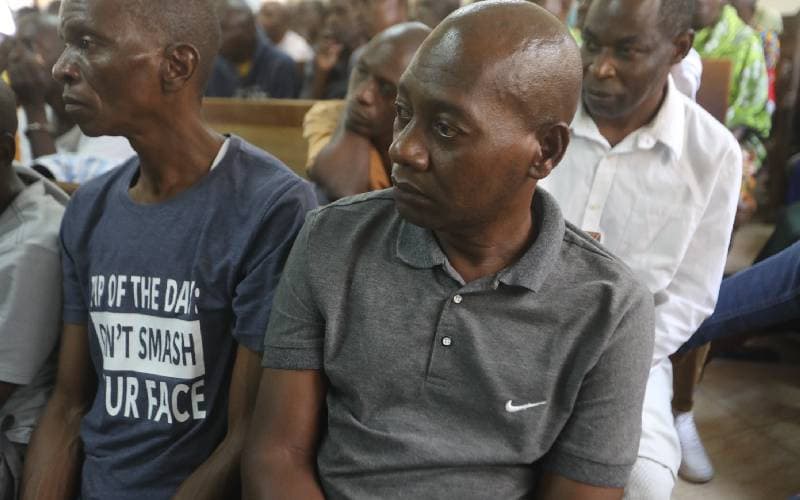We're loading the full news article for you. This includes the article content, images, author information, and related articles.
Testimony in a Shanzu courtroom alleges Paul Makenzi ate privately while his detained followers engaged in a hunger strike, believing it would secure their release. The claim adds a grim new dimension to the Shakahola massacre case that has horrified Kenya.

MOMBASA, KENYA – Controversial preacher Paul Makenzi, the central figure in the Shakahola forest massacre, secretly ate meals while his followers starved in police custody, a court heard on Thursday, October 30, 2025. The testimony, delivered at the Shanzu Law Courts before Principal Magistrate Leah Juma, paints a stark picture of alleged deception even after the horrific deaths of hundreds of his adherents came to light.
Assistant Superintendent of Police (ASP) Noor Abdi, the former Officer Commanding Station (OCS) at Malindi Police Station, testified that while Makenzi's co-accused followers refused food for days on end, Makenzi himself took meals in private. “We separated Mackenzie from the rest of the suspects, and our informer reported that Mackenzie ate while in the cell but did it secretly, so that his followers would not notice,” ASP Abdi told the court.
The court heard that between June 6 and June 14, 2023, at least 15 of Makenzi's followers detained at the station engaged in a hunger strike, refusing food for eight consecutive days. They reportedly believed this act of fasting was a spiritual exercise that would lead to “divine intervention” in their legal cases. Their health deteriorated to the point they became “extremely weak,” yet they continued to decline medical assistance, insisting their fast was for spiritual reasons, according to the former OCS.
ASP Abdi stated he was compelled to isolate Makenzi from the other detainees because the preacher was allegedly using an intermediary to pass messages encouraging the hunger strike. When cross-examined by Makenzi's lawyer, Lawrence Obonyo, Abdi clarified that he did not personally witness Makenzi eating but received the information from credible sources within the cells. The officer also produced official police communications sent to senior commanders reporting the mass refusal of food by the detained suspects.
The allegations of Makenzi eating in secret while his followers wasted away in custody mirror the broader accusations against him: that he instructed his followers in the Shakahola forest to starve themselves and their children to death to “meet Jesus” while he did not necessarily adhere to the same doctrine. The Shakahola massacre, discovered in April 2023, has exposed one of the deadliest cult-related tragedies in modern history, with the death toll now exceeding 429. Autopsies have revealed that while many died of starvation, others, including children, were strangled, beaten, or suffocated.
Makenzi and more than 90 co-accused face a litany of charges, including murder, manslaughter, terrorism, and child torture. The legal proceedings have been complex, with prosecutors initially charging Makenzi and 30 associates with the murder of 191 children in January 2024. After a lower court attempted to reduce the number of charges, the Court of Appeal in Malindi reinstated all 191 murder counts in April 2025, ruling that the complexity of the case did not justify severing the counts.
The trial has been marked by harrowing testimony from survivors. One woman told the court she lost all seven of her children to starvation under Makenzi's directives. Another witness, Stephen Mwiti, gave an emotional account of how his wife disappeared with their six children in August 2022 after following Makenzi's teachings. Survivors have described a systematic process of starvation, with children instructed to fast first, followed by women, and then men. Armed guards, referred to as a “militia,” allegedly enforced the fast, beating or strangling anyone who tried to escape or break the rules.
The tragedy has prompted a national conversation in Kenya about the regulation of religious organizations. President William Ruto established a commission of inquiry to investigate the massacre and review existing laws. A Senate ad hoc committee report noted significant security lapses in Kilifi County that may have allowed Makenzi's activities to go unchecked for years. Despite the ongoing legal proceedings and national scrutiny, the horror continues to unfold, with investigators discovering new mass graves in the nearby Kwa Binzaro village as recently as August 2025, believed to be linked to the cult.
Makenzi has pleaded not guilty to all charges. The trial continues, with the prosecution expected to call approximately 90 witnesses to build its case against the self-proclaimed pastor and his alleged criminal enterprise. The latest courtroom revelations add another layer of alleged cruelty to a case that has already left an indelible scar on the nation.
Keep the conversation in one place—threads here stay linked to the story and in the forums.
Sign in to start a discussion
Start a conversation about this story and keep it linked here.
Other hot threads
E-sports and Gaming Community in Kenya
Active 9 months ago
The Role of Technology in Modern Agriculture (AgriTech)
Active 9 months ago
Popular Recreational Activities Across Counties
Active 9 months ago
Investing in Youth Sports Development Programs
Active 9 months ago